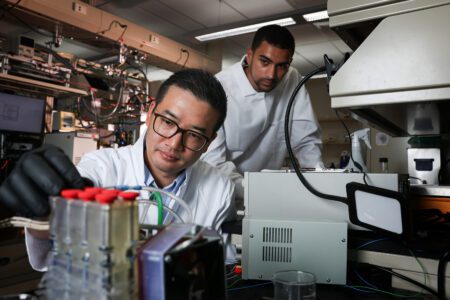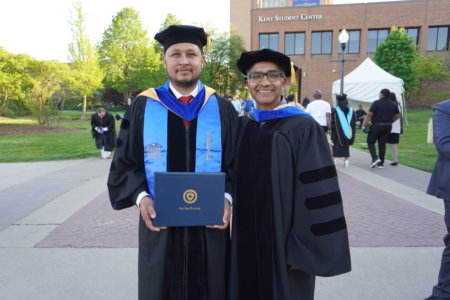
The future of medical care will be increasingly personalised, digital, and data–driven. These changes are already well underway but are poised to take off dramatically thanks to new technologies like artificial intelligence (AI) and innovations in diagnostics, patient care, and drug development.
The world’s top medical and health science schools are aware of this. Many have shifted their focus from producing practitioners to shaping leaders who can meet the new standards of patient care and well-being. They stand out for their know-how and dedication in enhancing global health quality, driving innovation, and addressing societal health disparities. Here are three institutions leading the charge in this new era of healthcare.

The University of Galway has taught medicine for over 175 years. Source: University of Galway
University of Galway
It is easy to see why 1,000 students from around the world choose the School of Medicine at the University of Galway every year. As many as 40% of its cohort are international students representing 35 countries – each drawn by the school’s reputation as the training ground to become doctors and medical practitioners of the finest quality.
At its beautiful, historic campus, you’ll learn from the best in their fields. Staff here conduct high level internationally competitive research in several key strategic areas, from medical technologies and cancer research to neuroscience and population health.
The school offers a selection of award-winning Postgraduate Taught Diploma and Master’s Degree Programmes. There are MSc programmes in Exercise Physiology and Rehabilitation, Applied Clinical Data Analytics, Evidence-Based Future Healthcare, and more. Meanwhile, Clinical postgraduate programmes span Interventional Cardiology, Radiology, Surgery (a fully online or blended option on campus), Clinical Education, and Healthcare Simulation and Patient Safety. Lab-based programmes are also available, ideal for those with a science or engineering background such as Cellular Manufacturing & Therapy and Regenerative Medicine.
Whichever you choose, you’ll get to live and learn in one of the top 2% universities in the world located in in the West of Ireland’s “City of the Tribes.” Only two hours drive from Dublin, the campus is set on the Atlantic edge of Europe and is one of the most vibrant cities to be a student. The population is young and diverse, perfect for those who love being part of a place where arts and culture are celebrated, reinterpreted and shared with the world. Apply to the University of Galway now.

During your medical studies here, you will undertake 1,800 hours of clinical placements. Source: Brunel University of London/Facebook
Brunel University of London
Brunel Medical School is advancing medical education and healthcare practice for a changing world. Whether it is through breakthroughs that aid those suffering from diseases, research designed to enhance the performance of elite athletes, or degree programmes to train the next generation of health professionals, the school aims to produce graduates who will make a difference in healthcare both in the UK and internationally.
The school offers two degrees, one of which is the Physician Associate MSc. It’s a great option for those seeking to move easily between different areas of patient care, ranging from general practice, cardiology, neurosurgery, paediatrics or other specialties in an ever-demanding and fast-changing NHS.
The Physician Associate MSc trains you to develop creative solutions in supporting doctors during the diagnosis and treatment of patients. The best part of this master’s programme is that you complete 1,800 hours of professional practice, placing you in a wide variety of real clinical environments. In the first year of your Physician Associate MSc, you’ll work one day a week and in your second year, four and a half days per week.
As a graduate, you can progress to a PhD, a chance to perform extensive research to contribute new knowledge to this field. There are five PhDs to choose from – they include Ageing Studies PhD, Human Performance, Exercise and Rehabilitation PhD, Occupational Therapy PhD, Sport, Health and Exercise Sciences PhD, and Welfare, Health and Wellbeing PhD.

The Albert Szent-Györgyi Medical School makes the ideal base to launch careers in medicine and pharmacy. Source: SZTE Szent-Györgyi Albert Orvostudományi Kar – SZOTE/Facebook
University of Szeged
One of Hungary’s largest top universities, the University of Szeged, has a history that dates back to 1581. Today, it is ranked among the world’s best 560 universities (QS World University Rankings) and is the 14th greenest amongst institutions located in city centres (GreenMetric World University Rankings). With living costs ranging between 600 and 1,000 euros, easy access to tourist sights, and the Student Union’s various academic and extra-curricular activities, students from about 120 countries are happy to call the University of Szeged home.
For aspiring doctors, dentists, pharmacists, physiotherapists and nurses, the University of Szeged makes the ideal base to launch their careers. The Albert Szent-Györgyi Medical School has been training doctors in the English Language for more than 35 years. Pair this experience with a solid foundation for clinical training, ready access to dedicated academic staff, mentors, modern infrastructure, comprehensive support, and diverse services, and students here have all they need to evolve into work-ready graduates.
Notable faculty members include Nobel Laureate Albert Szent-Györgyi (the former rector and professor of the Medical School who was the first to isolate Vitamin C from Szeged paprika) and Katalin Kariko (one of the inventors of new COVID-19 vaccines).
*Some of the institutions featured in this article are commercial partners of Study International










